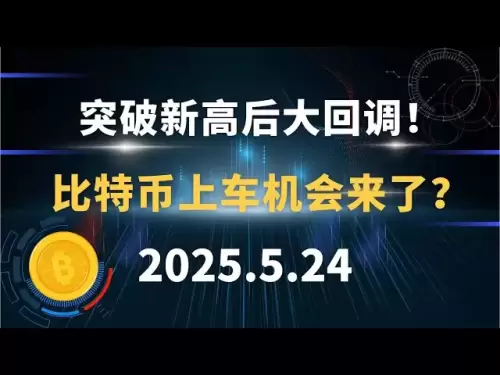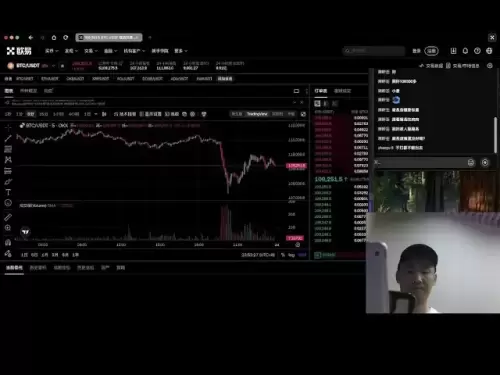 |
|
 |
|
 |
|
 |
|
 |
|
 |
|
 |
|
 |
|
 |
|
 |
|
 |
|
 |
|
 |
|
 |
|
 |
|
Cryptocurrency News Articles
US President Donald Trump’s exclusive dinner for top investors in his $TRUMP meme coin has ignited a firestorm of controversy
May 24, 2025 at 06:57 am
24th May 2025 – (Beijing) US President Donald Trump’s exclusive dinner for top investors in his $TRUMP meme coin has ignited a firestorm of controversy

The Trump administration’s melding of political office with private enterprise has come under harsh scrutiny following a lavish dinner hosted by U.S. President Donald Trump for top investors in his $TRUMP meme coin.
The event, held on the 24th of May at the Trump National Golf Club in Virginia, was billed as a gathering of the “most exclusive” crypto elite, but it also saw the value of Trump’s token plummet by 16% within hours, even as protesters outside decried the affair as “corruption embodied.”
The dinner, attended by 220 investors who collectively spent $148 million on $TRUMP tokens, is part of a broader move by the Trump administration to integrate cryptocurrency into U.S. governance. However, critics view these ventures as a blatant misuse of presidential authority for personal financial gain.
Among the attendees was crypto tycoon Justin Sun, known for his past as a fugitive from U.S. legal scrutiny. Formerly evading American jurisdiction due to SEC fraud charges and a Justice Department financial crimes investigation, Sun now emerges as the primary holder of Trump’s meme coin, investing $23 million for VIP access to the president.
Sun’s blockchain platform, Tron, previously under fire from U.S. authorities and the United Nations for its association with unlawful financial practices, has once again come under scrutiny. A confidential 2023 Treasury Department document highlighted the increasing utilisation of Tron by “unlawful entities,” with over $26 billion in illicit transactions linked to the network last year.
Despite Sun’s refutations and his efforts with entities like TRM Labs to combat illicit crypto activities, his participation in Trump’s initiatives — including a $75 million share in the Trump-affiliated World Liberty Financial — has sparked bipartisan disapproval.
Representative Glenn Ivey (D-Md.) expressed concerns during a congressional session, stating, “This frankly smells very bad,” and suggesting that the SEC’s decision to halt its proceedings against Sun may hint at political partiality.
The dinner’s secrecy further fuels allegations of corruption. Attendees gained entry through a pseudo-auction based on $TRUMP holdings, with the top 25 investors promised a “private VIP reception” and tour. Yet the identities of most remain shrouded behind pseudonymous blockchain wallets, such as “MeCo” and “REKT,” obscuring potential foreign influence.
A Bloomberg analysis revealed that over half of the top 220 wallets were linked to offshore exchanges, circumventing U.S. regulatory oversight. This anonymity, coupled with the Trump Organisation’s control of 80% of the token’s supply, paints a troubling portrait of a presidency enmeshed in speculative finance.
Central to the controversy is Trump’s alleged misuse of the presidential seal during his address—a potential federal violation prohibiting its use to imply government endorsement. While the White House insists Trump attended “in his personal capacity,” critics argue the event’s proximity to power undermines public trust.
“There’s a ‘For Sale’ sign on the White House lawn,” declared Senator Jeff Merkley (D-Ore.), flanked by protesters bearing signs like “Crypto Corruption” and “Trump is a Traitor.”
The market’s response was immediate and stark. After reaching a peak of $74.34 in January, the TRUMP token plummeted to $14.44 following the dinner, wiping out significant value and revealing the vulnerability of politically linked cryptocurrencies.
Investors such as Nicholas Pinto, who criticised the event’s inadequate security and disappointing cuisine, highlighted the disparity between the grandeur of the gala—where even Richard Mille watches were commonplace—and its lack of substance.
Pinto noted, “Many individuals had already divested from the coin,” adding, “They were checking their phones during the dinner to monitor any price fluctuations.”
This spectacle arrives at a pivotal juncture for U.S. crypto policy. The Senate’s GENIUS Act, a bipartisan stablecoin regulation bill, now faces disruption amid amendments targeting Trump’s ventures, including a Democratic push to bar presidents from profiting off crypto while in office.
Major banks like JPMorgan and Bank of America, meanwhile, eye a unified digital dollar to counter Tether’s global dominance—a vision imperiled by legislative stagnation.
In contrast, Beijing and Hong Kong offer a study in regulatory prudence. Hong Kong’s recent stablecoin legislation, mandating stringent licensing and oversight, reflects a deliberate approach to balancing innovation with accountability.
Justin Sun himself acknowledged the ripple effect of U.S. policy shifts, suggesting Trump’s embrace of crypto could spur similar recalibrations in Asia.
“If one side sees the other making efforts, it will definitely think about following up,” he remarked, alluding to the strategic rivalry between China and the U.S.
Yet the dinner’s fallout transcends mere policy debate. It epitomises a broader erosion of ethical guardrails in Western governance, where
Disclaimer:info@kdj.com
The information provided is not trading advice. kdj.com does not assume any responsibility for any investments made based on the information provided in this article. Cryptocurrencies are highly volatile and it is highly recommended that you invest with caution after thorough research!
If you believe that the content used on this website infringes your copyright, please contact us immediately (info@kdj.com) and we will delete it promptly.





























































